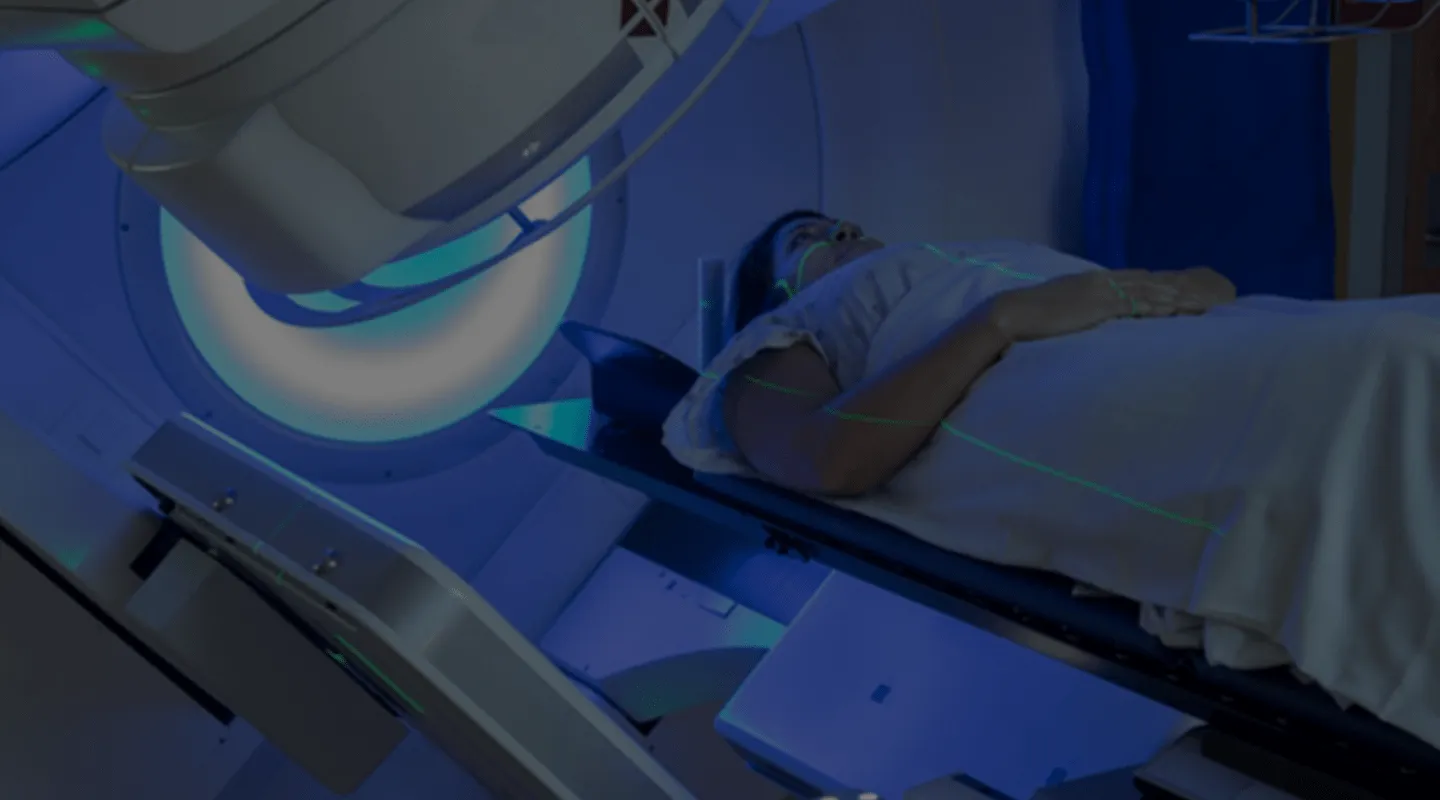
Radiotherapy
Your Affordable Radiotherapy in Tunisia
Benefit from high-precision radiotherapy as part of a secure and personalized medical stay.
How does it work?
Radiotherapy in Tunisia
In Tunisia, radiotherapy is a key element of cancer treatments. It is particularly effective in combating several types of cancer and is widely used today. Discover the indications, functioning, and follow-up of this treatment.
What is Radiotherapy in Tunisia?
Radiotherapy uses radiation to eliminate or prevent the multiplication of cancer cells. Its goal is to destroy these cells while preserving the surrounding tissues. Treatments are administered by a qualified radiation oncologist. Radiotherapy can be used in addition to other cancer treatments, such as chemotherapy or surgery. It can be performed before or after these treatments, with which it is combined.
What is the Price of Radiotherapy in Tunisia?
The price of radiotherapy treatment varies depending on the area to be treated. Radiotherapy prices remain very competitive compared to other destinations. The accelerators for radiotherapy are state-of-the-art, and the dedicated centers are ultra-modern. Feel free to request a quote for your radiotherapy in Tunisia.
Your health, our priority.
Request your free quote.
Who is Radiotherapy For?
Radiotherapy is primarily for patients with various types of cancer. It is used to treat many cancers, including breast, prostate, lung, brain, and digestive tract cancers. Radiotherapy may be recommended as the primary treatment to destroy cancer cells, in addition to other treatments such as surgery or chemotherapy to reduce tumor size before surgery, or to eliminate remaining cancer cells after surgery. It can also be used to relieve symptoms in patients with advanced or metastatic cancers, reducing pain and improving quality of life. Each patient is evaluated individually to determine if radiotherapy is appropriate, depending on the type of cancer, its stage, the patient’s general health, and their personal preferences.
What You Need to Know Before Your Radiotherapy Treatment in Tunisia
To validate the diagnosis and monitor the progression of the disease, a series of tests and examinations will be necessary, such as scans, MRIs, or others. You will also need to provide blood tests, a detailed health assessment, and any other medical documents to create a complete file. Before starting treatment, the radiation therapist will explain in detail the procedure and possible side effects. Feel free to ask this specialist all your questions in order to have all the necessary information on the risks associated with radiotherapy. Before starting your radiotherapy, it is essential to quit smoking. Tobacco may compromise the benefits of the treatment and accentuate its potential side effects.
What are the Different Radiotherapy Techniques Available in Tunisia?
- External radiotherapy: this is the most commonly practiced method; the patient lies on a table in a precise position, and a machine projects radiation. This radiation will pass through the skin and act directly on the tumor;
- Brachytherapy: during this procedure, radioactive sources will be placed directly into the patient’s body;
- Metabolic radiotherapy: this technique consists of injecting a radioactive substance directly into the patient intravenously (the substance can also be administered orally). The radioactive substance will eliminate the cancer cells present in the patient’s body;
How Does Radiotherapy Proceed in Tunisia?
Before starting the treatment itself, there are two essential steps that must be carried out:
- Locating the area of the body to be treated: the location, or simulation, consists of precisely locating the part of the body that will receive the radiation, as well as the volume to be treated. A CT scan will be performed, which will provide a three-dimensional medical image of the target;
- Dosimetry: this phase, performed on a computer, will allow for the precise calculation of the distribution of the dose of rays that will be projected onto the area to be treated. The dosimetrist and the radiation therapist collaborate during this procedure to determine the dosage that is best suited to the patient;
Once the location and dosimetry have been performed, it will be possible to communicate your treatment program to you, including the frequency and number of sessions required. In general, you will need between two and three weeks of treatment; only one session is performed per day, for a maximum of five days per week. Each session lasts about fifteen minutes on average. During a radiotherapy session, you will have to lie on a table, remaining in a precise position without moving. A device will emit the radiation (the rays are invisible), the session does not cause any painful sensations, you will not feel anything during the procedure.
Radiotherapy Recovery Time
Recovery time after a radiotherapy session can vary depending on several factors, including the area treated, the radiation dose, and the patient’s individual response. Immediately after each session, most patients may experience fatigue, which can accumulate over the weeks of treatment. This fatigue may persist for several weeks after the end of radiotherapy. In addition, specific side effects may appear, such as skin irritation, redness, or sensitivity in the treated area, as well as digestive or urinary problems depending on the location of the treatment. The skin in the irradiated area may require special care to prevent infection and promote healing. Patients are often encouraged to get enough rest, maintain a balanced diet, and avoid strenuous physical activity during the recovery period. Regular medical follow-up is crucial to monitor side effects and adjust care accordingly, thus contributing to optimal recovery. In general, although some side effects may persist, many patients regain a good quality of life a few weeks to a few months after the end of treatment.
What are the Follow-up Procedures for Radiotherapy in Tunisia?
During the duration of your treatment, several meetings with the radiation therapist will take place regularly. The specialist will check during each consultation the progress of your treatment as well as your general health. Once the program is finished, check-up visits will also be scheduled.
Our advantages


What are the Side Effects of Radiotherapy?
Before starting your treatment, it is essential to be aware of the risks associated with this procedure. The potential side effects will mainly depend on the area targeted on your body. Although the aim of radiotherapy is to destroy cancer cells, it should be noted that radiation can also affect healthy cells located in the same area. Indeed, the cells of the digestive tract and skin are among the most likely to be affected by this radiation. During radiotherapy, it is possible to experience various side effects such as hair loss, skin problems, nausea, vomiting, fatigue, and even cognitive disorders if the treatment is targeted at the brain. It is important to emphasize that these effects may occur during treatment or even several days or weeks after its completion. Feel free to discuss with your radiation therapist to find out about potential complications depending on the part of the body treated.
Radiotherapy Success Rate
The success rate of radiotherapy is high, with approximately 95% of patients achieving a significant reduction in tumor size or complete remission, depending on the type and stage of cancer treated. This percentage reflects the effectiveness of radiotherapy when used alone or in combination with other treatments such as surgery or chemotherapy. Radiotherapy works by targeting and destroying cancer cells while preserving as much as possible the surrounding healthy tissues. The success of the treatment depends on various factors, including the precision of tumor targeting, the dose of radiation administered, and the patient’s individual response to treatment. Despite its high effectiveness, it is essential to follow the recommendations of the medical team and participate in regular follow-ups to monitor the response to treatment and manage any side effects. Thanks to advanced technologies and personalized treatment protocols, radiotherapy continues to play a crucial role in the effective treatment of many types of cancer.
Your Radiotherapy in Tunisia with TDS
TDS offers to support you from A to Z for all your procedures in organizing your medical stay in Tunisia. In our ultra-modern clinic, your treatment will be planned with unparalleled precision thanks to our state-of-the-art radiotherapy equipment. Our renowned medical team, composed of radiation oncologists and specialists from various disciplines, will be at your disposal to accompany you throughout your journey. Feel free to contact our advisors to obtain all the information on the procedures necessary for your recovery.
—
Frequently Asked Questions
Yes, radiotherapy can be used to treat certain benign tumors, although this is less common. For example, it can be used for benign brain tumors such as meningiomas when they are located in areas that are difficult to access surgically.
Radiotherapy aims to damage the DNA of cancer cells, including cancer stem cells, rendering them unable to divide and proliferate. However, some cancer stem cells may be more resistant and require combination therapies to be effectively eliminated.
Radiotherapy is generally avoided during pregnancy due to the risks to the fetus, especially during the first trimester. However, in some urgent cases and after careful evaluation, it can be administered with precautions to minimize fetal exposure.
Advances such as intensity-modulated radiotherapy (IMRT), stereotactic radiotherapy (SRT), and proton therapy have significantly improved the precision of tumor targeting while sparing surrounding healthy tissues.
Although rare, radiotherapy can induce secondary cancers years after the initial treatment due to DNA mutations in healthy cells. However, the benefits of treating the primary cancer generally outweigh this long-term risk.
Radiotherapy is personalized through meticulous planning that takes into account the size, shape, and location of the tumor, as well as the patient’s overall health. Advanced imaging techniques are used to plan and adjust the treatment.
Radiotherapy can temporarily weaken the immune system by damaging immune cells in the treated area. However, it can also stimulate an immune response against cancer cells, an approach exploited in combination therapies with immunotherapy.
Non-cancerous tissues may experience side effects such as inflammation, scarring, and in some cases, fibrosis. Modern techniques aim to minimize these effects by precisely targeting tumors and sparing healthy tissues.
Yes, radiotherapy can be effective in treating metastases, especially when they are limited in number and location. It can reduce symptoms and control the growth of metastases to improve the patient’s quality of life.
Radiotherapy is often used in combination with other treatments such as surgery, chemotherapy, and immunotherapy. Its role can be neoadjuvant (before surgery to reduce tumor size) or adjuvant (after surgery to eliminate residual cells).
